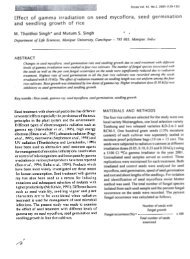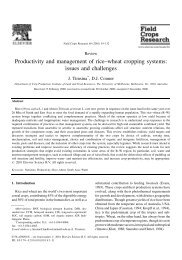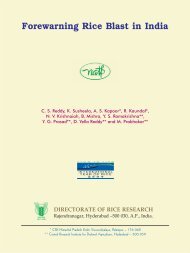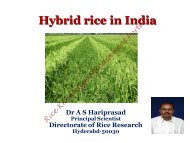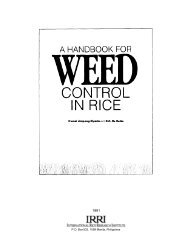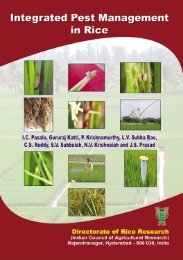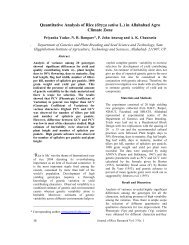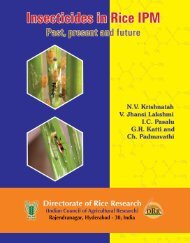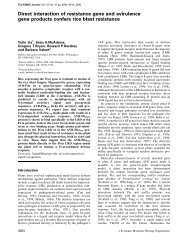Resource Book on Horticulture Nursery Management
Resource Book on Horticulture Nursery Management
Resource Book on Horticulture Nursery Management
You also want an ePaper? Increase the reach of your titles
YUMPU automatically turns print PDFs into web optimized ePapers that Google loves.
Temperature Effects<br />
The growing seas<strong>on</strong> of the parasite is affected by the temperatures of the<br />
surrounding. Many pathogen systems of cereal rusts in particular are affected by<br />
temperature. At times about half of the wheat cultivars showed differential resistance<br />
expressi<strong>on</strong> when tested against isolates of brown rust (leaf rust), either effective at 10°C<br />
and not at 25°C or vice versa.<br />
Method of Disease C<strong>on</strong>trol in <strong>Nursery</strong><br />
(A) Preventive Measures<br />
Cultural Practices: Cultural practices usually influence the development of disease<br />
in plants by affecting the envir<strong>on</strong>ment. Such practices are intended to make the<br />
atmospheric, edaphic, or biological surroundings favorable to the crop plant, unfavorable<br />
to its parasites. Cultural practices that lead to disease c<strong>on</strong>trol have little effect <strong>on</strong> the<br />
climate of a regi<strong>on</strong> but can exert significant influence <strong>on</strong> the microclimate of the crop<br />
plants in a field. Three stages of parasite’s life cycle namely, Survival between crops,<br />
producti<strong>on</strong> of inoculum for the primary cycle and inoculati<strong>on</strong> can be c<strong>on</strong>trolled by<br />
following preventive measures.<br />
1. Survival between Crops: Organisms that survive in the soil can often be c<strong>on</strong>trolled<br />
by crop rotati<strong>on</strong>s with unsusceptible species. Catch crop has been used to c<strong>on</strong>trol<br />
certain nematodes and other soil-borne pathogens. Soil-borne plant pathogens can be<br />
c<strong>on</strong>trolled by biological methods. Plant parasites may be c<strong>on</strong>trolled by encouraging<br />
the growth of antag<strong>on</strong>istic organisms. This can be achieved by adopti<strong>on</strong> of cultural<br />
practices such as green manuring and the use of appropriate soil additives. Soil-borne<br />
plant parasites may also be killed during their over-seas<strong>on</strong>ing stages by such cultural<br />
practices as deep ploughing, flooding, and frequent cultivati<strong>on</strong> and fallow. Plant<br />
diseases caused by organisms that survive as parasites within perennial hosts or<br />
within the seed of annual plants may be c<strong>on</strong>trolled therapeutically.<br />
2. Producti<strong>on</strong> of Inoculum for the Primary Cycle: Envir<strong>on</strong>mental factors (particularly<br />
temperature, water, and organic and inorganic nutrients) significantly affect Inoculum<br />
producti<strong>on</strong>. Warm temperature usually breaks dormancy of over seas<strong>on</strong>ing structures;<br />
rain may leach growth inhibitors from the soil and permit germinati<strong>on</strong> of resting<br />
spores and special nutrients may stimulate the growth of seas<strong>on</strong>ing structures that<br />
produce inoculum.<br />
3. Dispersal of Inoculum and Inoculati<strong>on</strong>: Cultural practices that exemplify avoidance<br />
are also effective in avoiding disseminati<strong>on</strong>. Dispersal can also be avoided over a<br />
larger span with the help of plant quarantine. Plant quarantine is the legally enforced<br />
stoppage of plant pathogens at points of entry into political subdivisi<strong>on</strong>s.<br />
4. Sample Inspecti<strong>on</strong>: One of the preventive measures to c<strong>on</strong>trol the diseases is the use<br />
of sample inspecti<strong>on</strong> method. Laboratory evaluati<strong>on</strong> of the representative sample<br />
drawn by the certificati<strong>on</strong> agency for the determinati<strong>on</strong> of germinati<strong>on</strong>, moisture<br />
c<strong>on</strong>tent, weed seed c<strong>on</strong>tent, admixture, purity, seed-borne pathogens.<br />
<str<strong>on</strong>g>Resource</str<strong>on</strong>g> <str<strong>on</strong>g>Book</str<strong>on</strong>g> <strong>on</strong> <strong>Horticulture</strong> <strong>Nursery</strong> <strong>Management</strong> : 75



